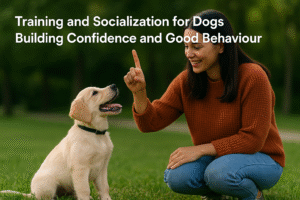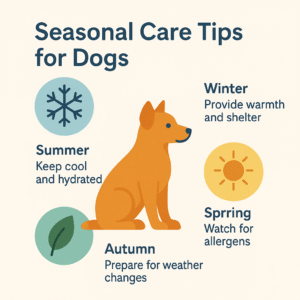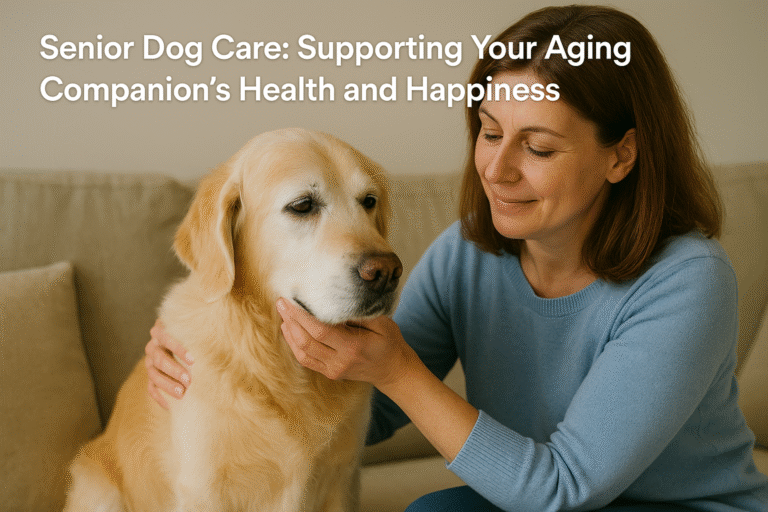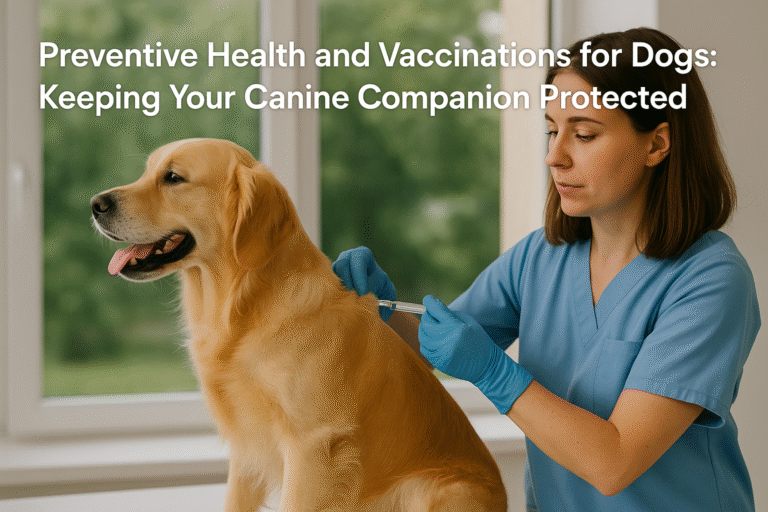As dogs grow older, their bodies undergo many changes. Slowing metabolism, reduced muscle mass, joint stiffness and declining senses are all natural aspects of aging. While your senior dog may not be able to run as fast or jump as high as they once did, thoughtful care can help them stay comfortable and thrive in their golden years. In this guide we’ll explore how to recognize signs of aging, why regular veterinary checkups are essential, and what you can do at home to support your aging companion.
Recognizing the Signs of Aging
Most dogs are considered seniors around seven years old, though this varies by breed and size. Larger breeds tend to age more quickly than smaller breeds. Common signs of aging include:
- Decreased energy or stamina
- Graying fur, especially around the muzzle
- Stiffness or lameness after rising or during walks
- Changes in vision or hearing
- Weight gain or loss
- Increased thirst and urination
- Behavioral changes, such as confusion or disorientation
Monitoring your dog closely helps you notice subtle changes early and address potential health issues before they progress.
The Importance of Regular Veterinary Exams
Because dogs age faster than humans, health problems can develop quickly. Smithfield Animal Hospital recommends senior dogs receive wellness exams twice per year to catch issues early. These checkups allow veterinarians to perform a comprehensive physical exam and run diagnostic tests. Common evaluations for seniors include blood work, urinalysis, thyroid testing, blood pressure measurement, radiographs, EKGs, abdominal ultrasound, dental exams and mobility assessments. By establishing a baseline and tracking changes over time, your veterinarian can detect subtle shifts in organ function and tailor preventive care.
Regular exams also provide an opportunity to update vaccinations, discuss nutrition and supplements, and adjust medications. Many conditions that affect seniors—such as kidney disease, diabetes or hypothyroidism—are manageable when diagnosed early. Don’t wait until your dog appears sick; proactive care leads to better outcomes.
Weight Management and Moderate Exercise
Maintaining an ideal weight is crucial for senior dogs. Excess weight places extra strain on joints, exacerbating arthritis and mobility problems. Smithfield Animal Hospital notes that weight management combined with moderate exercise helps reduce stress on joints and supports overall health. Controlled walks, swimming and gentle play are excellent ways to keep older dogs active without overexerting them. Avoid high-impact activities like intense ball chasing or jumping, which can injure aging joints. Work with your veterinarian to create an exercise plan appropriate for your dog’s breed, age and health.
Managing Arthritis and Mobility Issues
Arthritis is one of the most common conditions affecting senior dogs. Symptoms include reluctance to move, difficulty getting up, limping, stiffness after resting, and hesitance to climb stairs or jump. The Smithfield article lists many strategies for managing arthritis: monoclonal antibody therapy, pain medications, joint supplements (glucosamine, chondroitin), omega-3 fatty acids, toe grips for better traction, orthopedic beds, weight management, moderate exercise, physical therapy, laser therapy, acupuncture and environmental modifications+-+-+-+-+. Work closely with your veterinarian to develop a multimodal treatment plan. Providing non-slip rugs, ramps, and steps helps your dog navigate the home more comfortably.
Nutrition for Senior Dogs
An aging dog’s nutritional needs differ from those of an adult or puppy. Senior diets typically have fewer calories to prevent weight gain but include higher-quality protein to maintain muscle mass. Many formulas contain joint-supporting supplements like glucosamine and chondroitin, antioxidants to combat cellular damage, and omega-3 fatty acids to reduce inflammation. If your dog has kidney or heart disease, your vet may recommend a prescription diet. Always transition to a new diet gradually over 7–10 days to avoid digestive upset.
Mental Stimulation and Cognitive Health
Cognitive decline can occur as dogs age, leading to confusion, pacing or changes in sleep patterns. Keeping the brain active through mental stimulation may help slow cognitive dysfunction. Short training sessions, interactive toys, puzzle feeders and scent games engage your dog’s mind and provide enrichment. Teaching new tricks, even simple ones, can give senior dogs a sense of accomplishment. Maintaining a predictable routine and avoiding sudden environmental changes also helps reduce anxiety.
Creating a Senior-Friendly Environment
Adjusting your home environment will improve your senior dog’s comfort and safety. Consider these modifications:
- Non-slip flooring or rugs to prevent slips and falls.
- Ramps or stairs to help them get on furniture or into vehicles.
- Orthopedic beds with supportive cushioning.
- Raised food and water dishes to reduce strain on the neck and joints.
- Extra litter or potty breaks, as older dogs may need to relieve themselves more often.
- Soft lighting at night to help dogs with vision loss navigate.
Showering Your Senior with Love
Above all, senior dogs need patience and compassion. Their bodies may slow down, but their emotional needs remain strong. Continue to include them in family activities and provide gentle affection. Spend quality time cuddling, grooming and simply being together. Adjust your expectations and celebrate small victories. Many seniors enjoy sniff walks, where they can meander at their own pace and explore the world through their nose.
Conclusion: Cherishing Your Golden Years Together
Caring for a senior dog requires attentive observation, regular veterinary care and lifestyle adjustments. Biannual wellness exams, weight management, moderate exercise, joint support, balanced nutrition, mental stimulation and an accommodating home environment will help your aging companion stay healthy and happy. Remember that every dog ages differently, so consult your veterinarian for individualized guidance.
If you have any questions about senior dog care or would like to schedule a wellness exam, please contact us. We’re here to support you and your furry friend through every stage of life.













